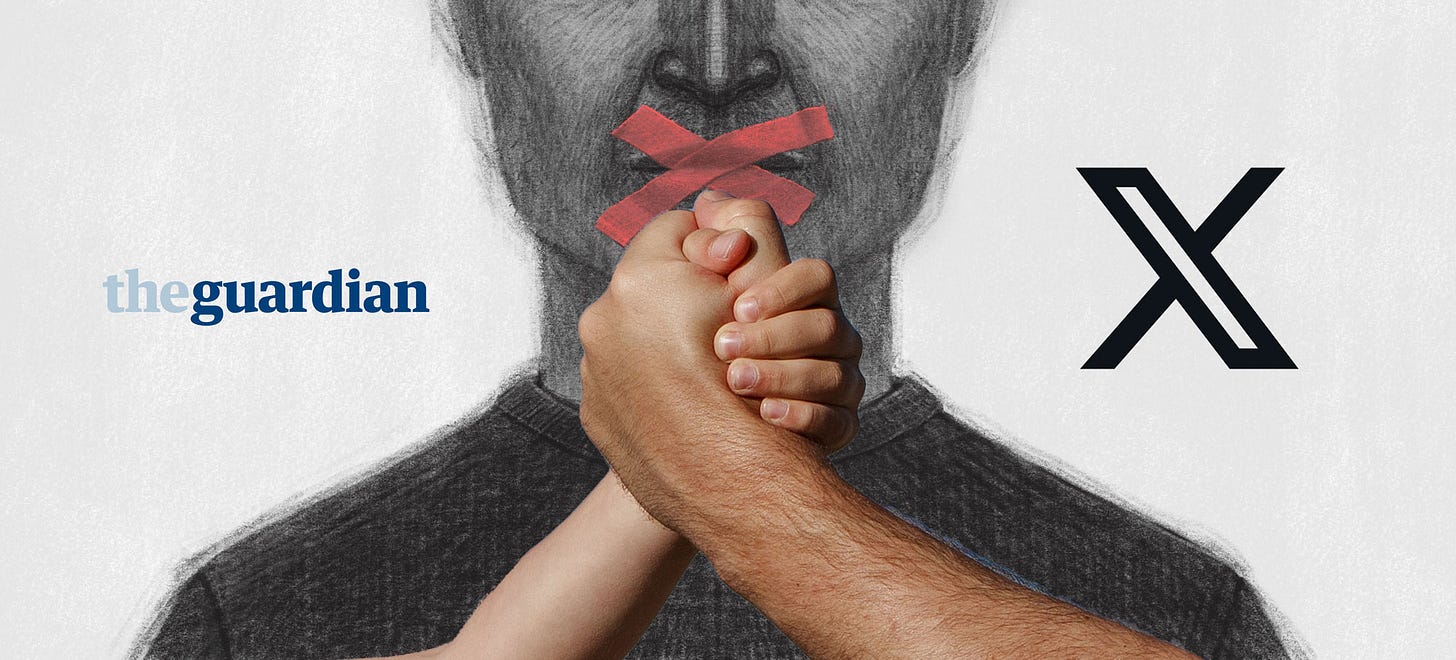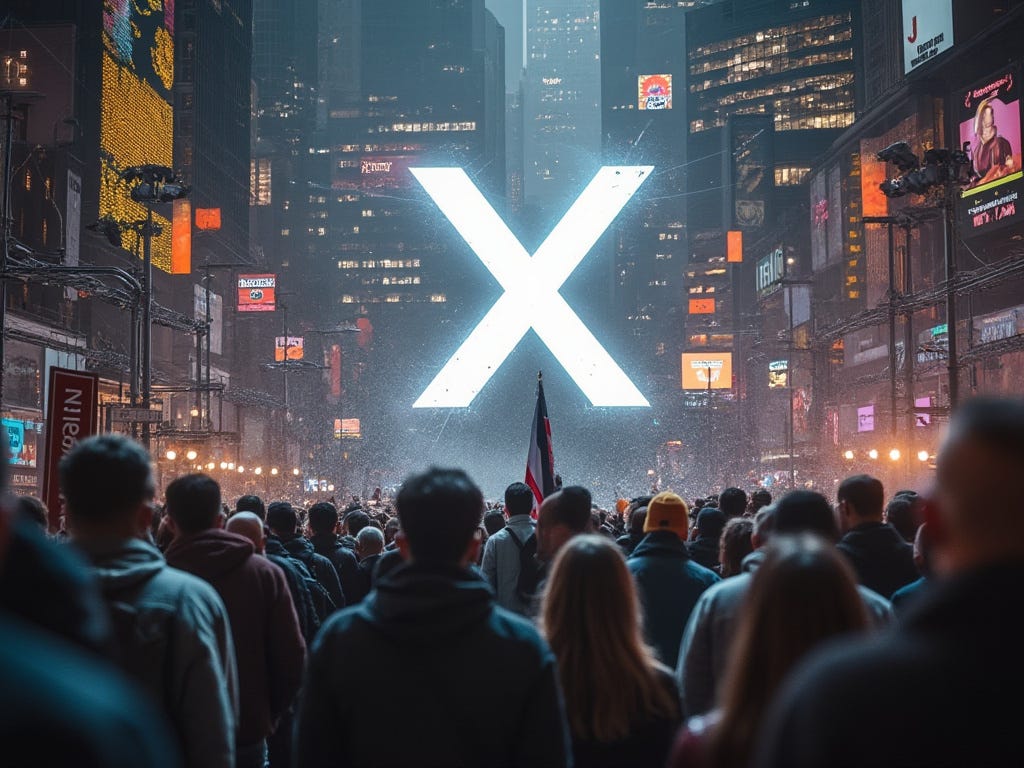In a bold move, The Guardian, the self-proclaimed ‘strong supporters’ of free speech, announced they will no longer be posting on X. Their explanation? There’s too much “disturbing” content on X, and in their cost-benefit analysis, it’s just not worth it. Too much “far-right” content and too many “conspiracies.”
I love how “far-right” is now used to denote anything against the mainstream or anything that used to be… normal.
What they’re really saying is that Elon’s approach to free speech—leaving up content that goes against mainstream views—is too… free. We all know, and thank goodness for that, that under Musk’s ownership, X has rolled back many of its prior restrictions, creating a platform that encourages more open expression, albeit one that critics like The Guardian argue enables “harmful content.” Don’t get me started on what qualifies as “harmful content.” Look at the UK recently, and you’ll see the future of free speech.
It used to be liberals who advocated for free speech. But now it’s conservatives who are the main free-speech advocates. Yes, we (conservatives) appreciate a freer platform where users can openly engage in debate, without the previous Twitter regime’s content restrictions that stifled particular perspectives.
We love opposition, we love conflict, they are essential for growth, development and healthy functioning in any society, group or individual.
A Platform of "Toxicity" or a Platform of Free Speech?
The Guardian’s parting words about X paint a dramatic picture of an alleged “toxic” environment, but the specifics of this toxicity remain… vague, as usual, left open to interpretation to fit their narrative. Musk’s efforts to promote free speech on X have indeed given voice to a broad spectrum of opinions and beliefs, from mainstream to controversial. The Guardian, however, insists that X has devolved into a breeding ground for hate speech and conspiracies. Of course, it goes without saying that much of the hate speech on X comes from liberals and those on the left—although the boundaries between liberals and left are becoming increasingly vague—who clearly do not favour free speech, struggle to engage in debate, have poor control of their emotions, and appear quite unbalanced. To be fair, not all are like this.
We know this perception stems from Musk’s refusal to censor certain viewpoints, even when they clash with widely accepted narratives or challenge prevailing political sentiments. But again, isn’t that what free speech is all about?
The newspaper’s departure suggests that some mainstream media outlets find it difficult to engage with platforms that do not enforce strict content moderation aligned with their ‘editorial standards’.
Rather than fostering open discussion and offering counter-arguments, The Guardian has chosen to step back entirely—a decision many interpret as a form of avoidance or selective engagement. It’s always easier to have everyone agree with you; it means less work for journalists.
What This Means for Political Discourse

Let’s talk facts now. Musk’s ownership of X has disrupted traditional media narratives, particularly those that align closely with government or institutional perspectives. In a move that many see as politically motivated—though it’s disconnected from reality—The Guardian cites Musk’s alleged influence on shaping political discourse around the U.S. presidential election as a primary concern. What they don’t understand is that X is not Musk!
Freeing Twitter from its prior restrictions simply allowed regular people to express their opinions without fear, and the number of these once-silenced voices turned out to be far larger than the mainstream media anticipated.
The implication here is that the platform’s freedom to foster diverse political expression poses a threat to certain established narratives, but this is in the very spirit of democracy and open dialogue.
Ironically, while The Guardian may have issues with X’s current policies, they’re willing to continue using the platform for “news gathering” and even embedding X posts in their articles, indicating that X still serves a vital function in today’s information ecosystem. Hypocrisy, isn’t it? After all, X is now the number one source for news worldwide. So, this selective engagement raises questions: is X truly “toxic,” or is The Guardian more concerned about controlling the narratives its readers consume?
Media Critics and the Double Standard of Censorship
Criticism from conservatives and free speech advocates has been swift and biting. The Guardian was notably silent on issues such as the censorship of the Hunter Biden laptop story, questions about Biden’s mental state, and controversies surrounding Kamala Harris, among others. The Hunter Biden laptop story, in particular, is a significant controversy, with the previous Twitter administration limiting the reach of this important news item.
It’s clear that The Guardian and other mainstream outlets may have no objection to censorship as long as it aligns with their editorial views or protects certain political interests. Again, full-on proponents of freedom of speech, yeah!
The Guardian’s decision highlights a double standard when it comes to censorship. Media outlets that have historically advocated for press freedom and open discourse now appear to draw the line at a platform that refuses to censor views contrary to their own. This departure indicates not so much an aversion to “toxicity” itself but rather to a platform where narratives aren’t easily controlled.
Moving Forward: Can Media Thrive Without Public Platforms?
As one of the most widely read liberal newspapers, The Guardian commands a substantial following, with over 27 million followers on X. By stepping away, the publication may be risking its reach, relevance, and direct connection to readers who consume news on the platform. Self-harm?
The debate now centers on whether The Guardian is leaving in protest of X’s supposedly harmful content or retreating from a platform where it feels it can no longer shape the conversation unchallenged.
In an age where transparency, dialogue, and accountability are more crucial than ever, The Guardian’s exit from X reveals more about its approach to information and influence than about the platform itself. Alongside European efforts to challenge X and Elon Musk, there seems to be something even larger at play.
The established world order is at stake, and the plans of a select few are being disrupted. As Yuval Noah Harari noted in his interview with Steven Bartlett, 'If Trump wins, it will be the end of the new world order.' Perhaps bad news for them, but good for us!
X is not the “toxic” platform they claim, it is a landscape of free speech that naturally includes difficult discussions. For me, things are pretty clear …






Let's see what Elon does for the people of America, now that he has an official position of power. We know what he did at Twitter after gaining control.
I recently read that Elon Musk asked X's software engineers to rewrite the code to enable Musk's postings to get a higher priority and rating than anyone else's. I would call this a form of censorship. It focuses on a particular view to the negation of others. Elon's move may also be classified as arrogance.
Elon did this when President Biden's postings went ahead of his.
Guardian's leadership, in this regard is commendable.
Of course! Who am I, in the context of importance?